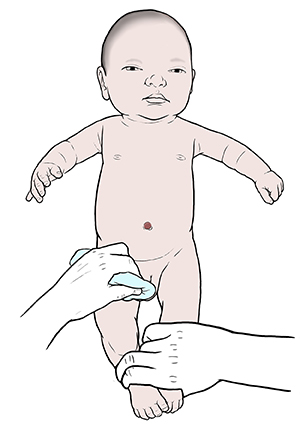Care After Circumcision
Your baby had a procedure called circumcision. This is a procedure to remove the baby’s foreskin. The foreskin is the layer of skin that covers the tip (glans) of the penis. It's most often done in the nursery before a male baby goes home from the hospital, if the family chooses to have it done. Circumcision can be done in a number of ways. Your healthcare provider will explain the procedure and tell you what to expect. Follow the guidelines on this sheet and instructions from your baby's healthcare provider to care for your baby after the circumcision.
What to expect
-
A crust of bloody or yellowish coating may appear around the head of the penis. This is normal. Don't clean off the crust or it may bleed.
-
The penis may swell a little or bleed a little around the incision.
-
The head of the penis might be slightly red or black and blue.
-
Your baby may cry at first when urinating, or be fussy for the first couple of days.
-
Skin-to-skin cuddling and breastfeeding may help reduce pain.
-
The skin should heal in about 7 to 10 days.
Keep the penis clean
-
Gently wash the penis with warm water during diaper changes if there is stool on it.
-
Use a soft washcloth. Don't rub the sore area. It may slow healing or cause bleeding.
-
Let the skin air-dry.
-
Change diapers often to help prevent infection.
-
Coat the head of the penis with petroleum jelly and gauze if the healthcare provider says to.

For the Gomco or Mogen clamp
-
If there is gauze or a bandage on the penis, follow your healthcare provider's specific instructions on when to remove it, replace it, or both.
For the Plastibell device
When to call the healthcare provider
Call your baby's healthcare provider if any of these occur:
-
Your baby's penis is very red or swells a lot.
-
Your child has a fever of 100.4°F (38°C) or higher, or as advised by your healthcare provider.
-
Your child is acting very ill, listless, fussy, or refuses to eat.
-
There is discharge or drainage that looks cloudy or does not go away.
-
Bleeding can't be stopped by applying gentle pressure or is larger than a quarter-size on the diaper.
-
Your baby is not urinating normally
© 2000-2024 The StayWell Company, LLC. All rights reserved. This information is not intended as a substitute for professional medical care. Always follow your healthcare professional's instructions.